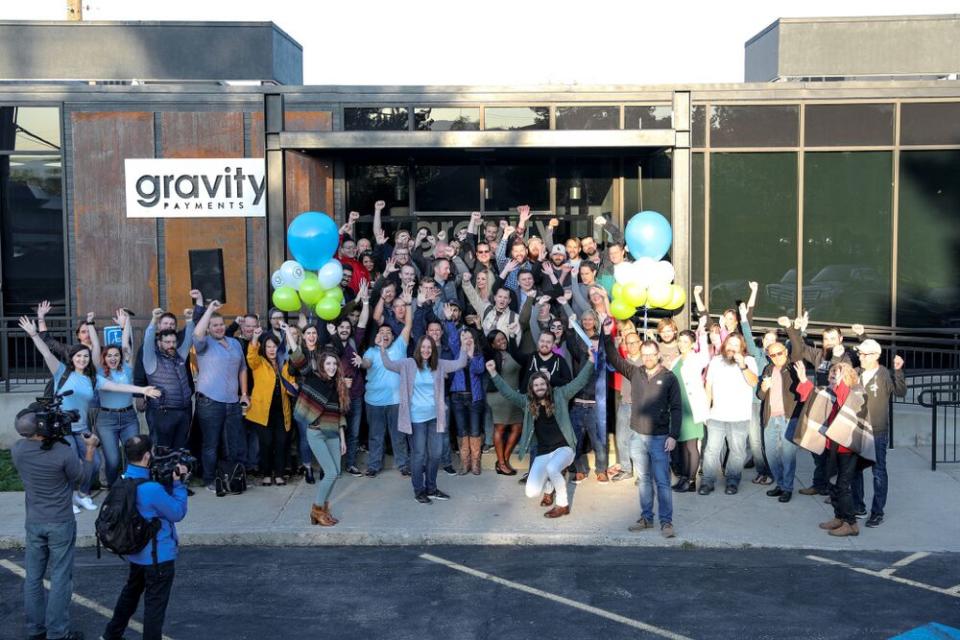CEO Dan Price, Who Gave Employees $70K Salary, Reveals 'Aggressive' Advice to Raise Your Income

Dan Price has learned much about the ins and out of running a business since founding his credit card processing company in 2004. But the experience has shown him more about life, too.
One of these realizations, the Gravity Payments CEO says, was something most people would find unexpected: that concentrating too much on increasing your net worth can have a negative effect. This prompted the 35-year-old entrepreneur to then slash his own million-dollar salary by a whopping 90 percent.
“I don’t think people realize that when attaining wealth for its own sake, it makes it harder for other people to have what they need,” Price tells PEOPLE of the drastic change in 2015. “The big realization for me was I was part of the problem.”
Fixing this problem would mean finding a salary amount that would ensure all his employees could comfortably afford necessities and save extra for themselves and their families.
Along with his salary cut, Price did something radical by raising the minimum salary at Gravity Payments to $70,000 per year.
“There’s a number where if you make less than that, it’s going to hurt you, your well-being, in a major way,” Price says. “For the vast majority of people out there, their health and well-being are harmed if they’re making less than $70,000 a year.”
RELATED: CEO Who Cut His Own Salary Gives New Employees Immediate $10K Raise, with $30K to Follow

Price also implemented the same raise for his Idaho-based employees who joined Gravity after it acquired another company three years before. At the time, many were making below $30,000.
But Price doesn’t just want his own employees to reap the benefits of this financial philosophy — he wants everyone to benefit, even if it means taking things into your own hands and not waiting for your employer.
“My advice for everybody is to have an aggressive plan to get to $70,000 wherever you work,” Price says. “Focus intensely on getting to that $70,000 number.”
This isn’t simply about asking for a raise, Price emphasizes — it’s about having a conversation on how to get there.
“Go to your boss and say you want to add more value. That you don’t want them to give it away to you, but you want to get to $70,000,” says Price. “Tell them it’s really important, and that you need help to come up with a plan to get there.”
RELATED: Boyfriend Left Woman with $88,000 in Debt — Here’s How Suze Orman Helped Her Out of It

When that goal is reached, the focus changes.
“Once you get there, or above it to a point where you’re comfortable, do a complete 180 and focus on helping other people get there,” he says. “Take your focus away from trying to get your own income to be higher after that.”
Price’s reasoning was inspired in part by a 2010 study that claimed one’s happiness and well-being may rise with income but only to a certain point. Researchers believed a salary past $75,000 wouldn’t significantly affect one’s emotional well-being, and that incomes higher than that could buy life satisfaction, but not happiness.
RELATED VIDEO: 5 Financial Mistakes to Avoid in Your 20s
Around that time, he was on a hike with a close friend, mother and military veteran who just had her rent increased by $200.
“It was just throwing her life into total chaos,” Price recalls of their conversation. “I talked to her about it, and she thought that a salary of $70,000 was the amount that she would need to be able to take care of all of her obligations and her son.”
RELATED: CEO Dan Price on His Decision to Make Entire Company’s Minimum Wage $70K/Year
Of course, someone’s personal salary goal may vary considering their circumstances and location, Price says. But the thinking remains the same — concentrate on reaching a salary that allows you to live comfortably, then give back.
“Tell people around you,” he suggests, “your friends, your family, your mentors, the people you work with, your career counselor at your high school or your junior high or your college. Let them know you want to be able to live a normal life and not be stressed.”
“It’s really just understanding your own personal finances, understanding how much you need to make to not think about money all the time,” Price adds, “and then getting there.”

 money
money 